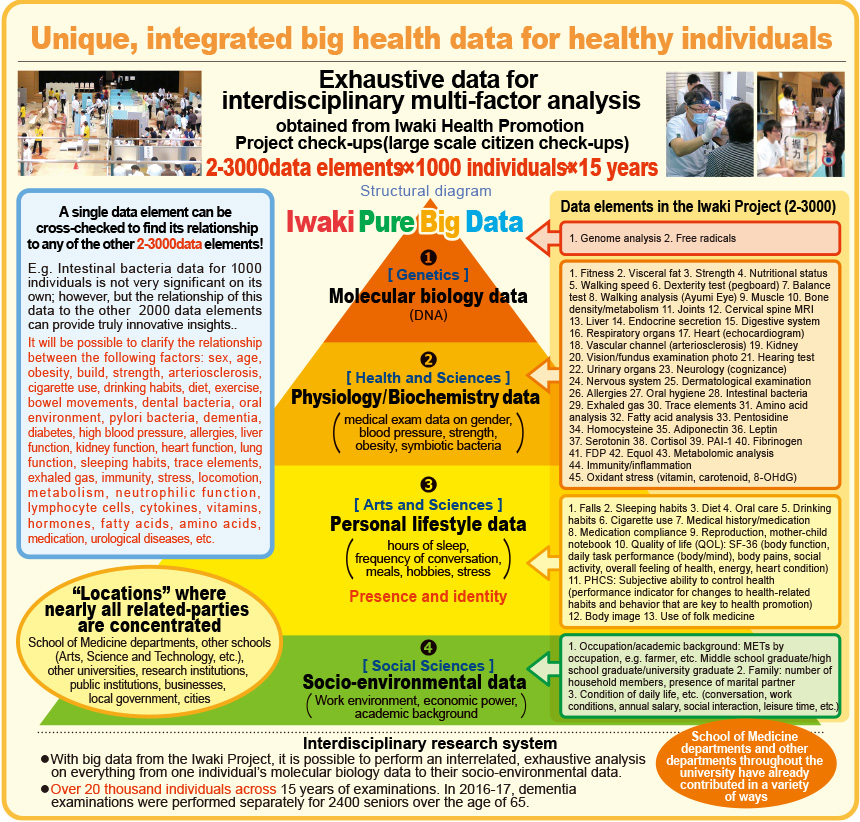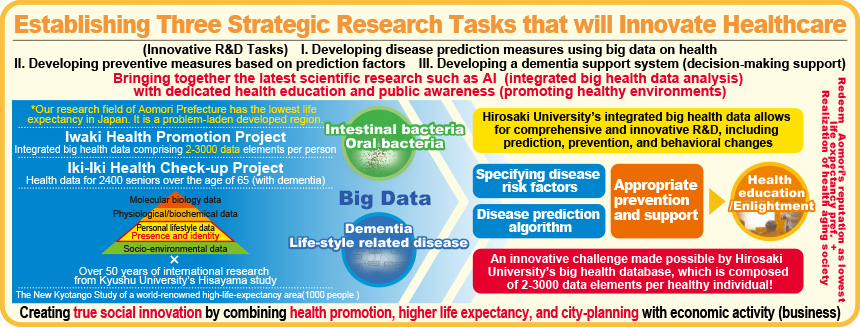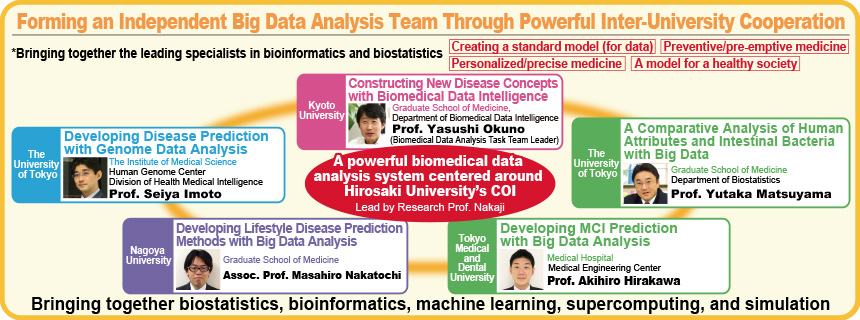Fundamental Research
Attracting Global Attention -Integrated Health Big Data
What We Can Obtain from the Health Data of 2000-3000 Elements and 20000 People.

The citizen data obtained through the Iwaki Health Promotion Project check-ups is not limited to the basic physiological/biochemical data obtainable from fitness, blood, and urine tests. When analytical data (time-consuming and costly strength measurements (exercise ability), genome analysis, neutrophilic function measurements, lymphocyte cell analysis, intestinal/oral bacteria, fatty/amino acid analysis, blood/metabolomic analysis, measurements for trace elements in blood serum, elemental analysis in exhalation, etc.), personal lifestyle data (sleeping hours (time sleeping), dietary information, etc.) and socio-environmental data (work environment, composition of family, academic background, etc.) are combined, there are over 2000 data elements.
Utilizing this “big health data” allows for an interdisciplinary, exhaustive analysis that embraces everything from data used in molecular biology to data used in the social sciences. In other words, this is a pioneering and all-encompassing health research platform in which researchers from all types of fields can participate.
Citizens partaking in check-ups through the Iwaki Health Promotion Project must bear the great burden of examination times of 5-7 hours, or more. However, it is through the deep trust established between this university and local citizens that “big health data” is accumulated annually.
The fields of research have been further expandedwith the help of satellite centers, such as the Kyoto Prefectural Medical University (which is developing a decision-making support system for persons with dementia and conducting a cohort study in Kyotango) and the Kyushu University School of Medicine (which leads the world-renowned “Hisayama-machi Research” program), in addition with Meio University and Wakayama Medical University. Since 2015, Hirosaki University has grown its big data by becoming involved in Kyushu University’s “Large-Scale Dementia Research Cohort for the Creation of Healthy Socities with High Life Expectancies” and by teaming up with the City of Hirosaki to conduct the “Iki-iki Check-up” health survey of senior citizens.
Furthermore, by turning to the leading specialists in bioinformatics and biostatistics at Kyoto University (School of Medicine), the University of Tokyo (School of Medicine), the Institute of Medical Science at the University of Tokyo, Nagoya University (School of Medicine), and Tokyo Medical and Dental University. it is hoped that the big data analysis system can be strengthened, the latest research can be promoted and new value in big data can be created through the application of artificial intelligence.

Big Data Analysis for the Prevention of Dementia and Lifestyle Diseases
Big health data analysis allows us to research the characteristics of mild cognitive impairment (MCI) at high speed.
MCI refers to cognitive performance problems that do not interfere with daily life. Research tells us that if such a decline in cognitive performance is detected early on, preventive measures can be put in place and the onset of dementia can be slowed.
Until now, the data elements that were studied in the Iwaki Health Promotion Project have included age, diet, cigarette use, drinking habits, sleep conditions, presence of diabetes, and blood pressure. To these, we have introduced testing for new data elements, such as genetic information, intestinal bacteria, dental bacteria, blood metabolome analysis, amino/fatty acid analysis, oxidant stress, serum trace elements (12 kinds), exhaled gas analysis (4 kinds), and so on. Overall, we can expect new findings.


